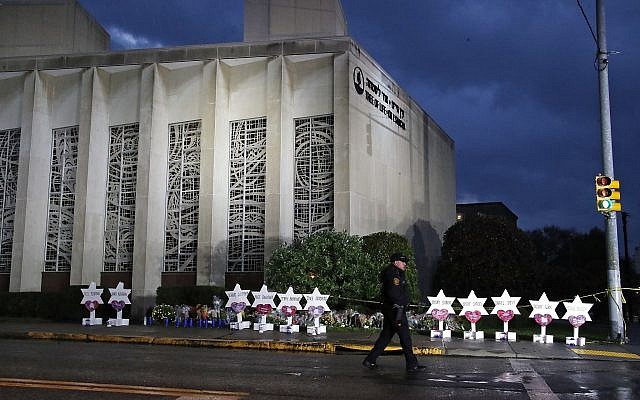
There is something for us to pay attention to given that the worst anti-Semitic mass killing in U.S. history occurred in a synagogue named “Tree of Life” during a service of circumcision when life is celebrated.
As an adherent to the Christian faith, I’ve had a deep love and respect for the Jewish faith and have been blessed with many Jewish friends over the years. My heart cannot comprehend this type of hatred. My mind, however, has tracked the history of this hatred throughout civilization.
The Jewish faith has always fought against oppression, even being born in the cocoon of slavery as told in Exodus. But life has always emerged out of this oppression, and the hatred expressed in Pittsburgh will be no different.
I am not worthy to write on this subject, soI’d like to leave you with words from others who are.
The Apostle Paul, Romans 11:16
16 If the part of the dough offered as firstfruits is holy, then the whole batch is holy; if the root is holy, so are the branches.
Lou Weiss, Amalek Comes to Pittsburgh, (Wall Street Journal; October 29, 2018; selections)
There are not so many of us Jews in the world—something like 0.2% of the population—so we pride ourselves on punching above our weight. We introduced some of the foundational ideas of Western civilization: the sanctity of human life, uniform morality, freedom, concern for the downtrodden, the weekend.
Sadly we are also above average in attracting evil people who hate what we stand for. This murderer, like all anti-Semites, resents the ideas that we carry in this world.
In last week’s Torah portion, we read about how Abraham bargained with God to preserve the occupants of Sodom. Beyond their signature activity, the Sodomites committed real crimes related to their treatment of strangers. Abraham asks for God’s forbearance if he can find 10 good men in the city. He couldn’t, and subsequently 10 became the minimum number for a Jewish prayer service. The number of Jews murdered at the Tree of Life Saturday was 11.
Rebecca Bratten Weiss, Everlasting is their Heritage: A Jewish Prayer for the Dead (Patheos/Suspended in Her Jar; October 27, 2018; selections)
One disturbing effect of the recent uptick in incidents of mass gun violence is that we have become so accustomed to them. “Another shooting,” we say. We get the usual thoughts and prayers ready, and carry on with the same arguments.
This time, though, I listened to the news without the customary desensitization. It wasn’t only because I was driving into Pittsburgh, passing a few miles away from where the tragic massacre happened; it was also because I am ethnically Jewish, and still practice many of the traditions and rituals from the ancient faith of my mothers. The science of genetics shows that we carry in our own DNA the marks of our ancestors’ experiences. I believe we may sometimes even experience this as a kind of bodily ESP, a sense of shared joy or pain with those with whom we are connected. For the Jewish people, and for others who have been subjected repeatedly to massive systemic violence, carrying the memories of our ancestors means carrying a hidden remembrance of suffering.
For those of us who are religious, we can also pray for the healing of those who have survived, for some comfort to be given them in a time of unimaginable loss. And join them in honoring the dead with this traditional Jewish prayer, a prayer which speaks to the resilience which we carry, along with the pain.
“El Malei Rachamim”
G-d full of mercy, Who dwells above, give rest on the wings of the Divine Presence among the holy, pure, and glorious who shine like the sky, to the souls of your people, for whom charity was offered in the memory of their souls. Therefore, the Merciful One will protect their souls forever, and will merge their souls with eternal life. The Everlasting is their heritage, and they shall rest peacefully at their lying place, and let us say: Amen.
Esther O’Reilly, To Pittsburgh, And To Life (Patheos/Young Fogey: Notes from a Student of Human Nature; October 29, 2018)
When I encounter overwhelmingly sad news, bits of music tend to flood to mind. The news out of Pittsburgh was no exception. One in particular kept recurring: not a sad song, but an almost frenetic celebration of joy and life. Yet it’s a celebration that is nonetheless tinged at the sharp edges with a rueful quality, sung in the voice of a people acquainted with grief. It is “L’Chaim (To Life)” from Fiddler On the Roof. As a child shoving our double VHS into the player over and over, I was always too intoxicated by the whirl of scarves and drunken, dancing men to catch all the lyrics clearly.
It was not until some years later that I heard the song again, sung lustily by amateurs at a wedding, as if for the first time. It was then that I heard it: the sadness. The quick stabs of sharp, wry resignation. “It takes a wedding to make us say ‘Let’s live another day!’” “May all your futures be pleasant ones, not like our present ones.” “And if our good fortune never comes, here’s to whatever comes.”
Most poignantly, from the very beginning: “Life has a way of confusing us, blessing and bruising us.” Then the first verse just after that line:
God would like us to be joyful
Even when our hearts lie panting on the floor
How much more should we be joyful
When there’s really something to be joyful for?
Now, when I hear this song, I will think of the congregation gathered in Tree of Life synagogue to celebrate a bris, when there was really something to be joyful for.